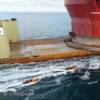U.S. Customs and Border Protection (CBP) Commissioner Robert C. Bonner announced that starting July 6, 2004, CBP will begin full enforcement of the automation requirement for vessel carriers under the Trade Act Regulations.
The regulations provide that CBP must receive cargo information electronically via a CBP-approved data interchange system before the cargo is brought into the United States.
CBP uses the cargo information to identify and eliminate potential terrorist threats before a vessel sails from a foreign port to U.S. seaports, rather than after a vessel and its cargo arrives in the United States.
"Customs and Border Protection needs accurate cargo data and we need it quickly to protect our homeland and the American people from potential terrorist threats entering through our seaports," stated Commissioner Bonner. "The automation required by the Trade Act will bring both the Trade and CBP closer into the 21st century."
The Trade Act Regulations makes this possible by requiring vessel carriers to transmit the data electronically to CBP via the Vessel Automated Manifest System (AMS). With almost 9 million sea containers arriving in the U.S. each year, automation and the use of state-of-the-art technology allows CBP to quickly and efficiently risk-target cargo for potential terrorist threats.
The Trade Act of 2002 regulations which became effective on January 5, 2004 made automation mandatory for all modes of transportation, both inbound and outbound. The inbound vessel mode is the first to be affected.
On March 4, 2004, inbound vessel cargo information was required to be transmitted electronically. CBP adopted a progressive enforcement strategy to address violations of the Trade Act Regulations. Enforcement for bulk carriers and break-bulk carriers including passenger vessels started on April 2, 2004. The enforcement actions included denial of preliminary entry, issuance of penalties at each port of arrival, and denial of unloading. During the informed compliance period, CBP issued warning notices to vessel carriers that arrived in violation of the Trade Act Regulations.
Effective July 6, 2004, all inbound vessel carriers must comply with the Trade Act Regulations' mandate to automate. There are no exceptions or waivers to the automation requirement. Vessel carriers that continue to arrive and present paper Inward Cargo Declarations (CBP Form 1302) to CBP in violation of the Trade Act Regulations will be denied permission to unload cargo. However, passenger vessels will be allowed to disembark passengers.
For more information on the Trade Act Final Regulations (68 FR 68144) for all modes of transport, please log on to CBP's Web site at http://www.cbp.gov/xp/cgov/import/communications_to_industry/advance_info/.
Sponsored Content
Innovative Hull Maintenance: Profitable & Green

Subscribe for
Maritime Reporter E-News
Maritime Reporter E-News is the maritime industry's largest circulation and most authoritative ENews Service, delivered to your Email five times per week












